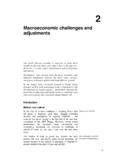Transcription of POLICIES TO ENHANCE SUSTAINABLE DEVELOPMENT
1 ORGANISATION FOR ECONOMIC COOPERATION AND TO ENHANCESUSTAINABLE DEVELOPMENTMEETING OF THE OECD COUNCILAT MINISTERIAL LEVEL,2001 POLICIES to EnhanceSustainable DevelopmentORGANISATION FOR ECONOMIC CO-OPERATION AND DEVELOPMENTORGANISATION FOR ECONOMIC CO-OPERATION AND DEVELOPMENTP ursuant to Article 1 of the Convention signed in Paris on 14th December 1960, andwhich came into force on 30th September 1961, the Organisation for Economic Co-operationand DEVELOPMENT (OECD) shall promote POLICIES designed: to achieve the highest SUSTAINABLE economic growth and employment and a risingstandard of living in Member countries, while maintaining financial stability, andthus to contribute to the DEVELOPMENT of the world economy; to contribute to sound economic expansion in Member as well as non-membercountries in the process of economic DEVELOPMENT ; and to contribute to the expansion of world trade on a multilateral, non-discriminatorybasis in accordance with international obligations.
2 The original Member countries of the OECD are Austria, Belgium, Canada, Denmark,France, Germany, Greece, Iceland, Ireland, Italy, Luxembourg, the Netherlands, Norway,Portugal, Spain, Sweden, Switzerland, Turkey, the United Kingdom and the UnitedStates. The following countries became Members subsequently through accession atthe dates indicated hereafter: Japan (28th April 1964), Finland (28th January 1969),Australia (7th June 1971), New Zealand (29th May 1973), Mexico (18th May 1994),the Czech Republic (21st December 1995), Hungary (7th May 1996), Poland(22nd November 1996), Korea (12th December 1996) and the Slovak Republic(14th December 2000).
3 The Commission of the European Communities takes part inthe work of the OECD (Article 13 of the OECD Convention). Publi en fran ais sous le titre :POLITIQUES A L APPUI DU D VELOPPEMENT DURABLE OECD 2001 Permission to reproduce a portion of this work for non-commercial purposes or classroomuse should be obtained through the Centre fran ais d exploitation du droit de copie (CFC),20, rue des Grands-Augustins, 75006 Paris, France, tel. (33-1) 44 07 47 70, fax (33-1) 46 34 67 19,for every country except the United States. In the United States permission should beobtained through the Copyright Clearance Center, Customer Service, (508)750-8400,222 Rosewood Drive, Danvers, MA 01923 USA, or CCC Online: All otherapplications for permission to reproduce or translate all or part of this book should be madeto OECD Publications, 2, rue Andr -Pascal, 75775 Paris Cedex 16, France.
4 3 OECD 2001 PrefaceIn May 1998, OECD Ministers agreed .. that the achievement of sustainabledevelopment is a key priority for OECD countries. They encouraged the elabora-tion of a strategy .. in the areas of climate change, technological DEVELOPMENT ,sustainability indicators, and the environmental impact of subsidies . They alsoagreed .. to interpret the term SUSTAINABLE as including social and environmen-tal, as well as economic, considerations , and in a context of .. integratingeconomic, environmental and social POLICIES to ENHANCE welfare.
5 Finally, they .. stressed the importance of promoting effective integration of environmentalconsiderations in the multilateral [ trade and investment] system . A report,including policy recommendations, was anticipated in report POLICIES to ENHANCE SUSTAINABLE DEVELOPMENT responds to that mandate. Itdraws mainly on recent work done by the OECD and its affiliate Organisations1 onvarious themes related to SUSTAINABLE DEVELOPMENT . It also uses other appropri-ate sources to complete the discussion of these themes. Consistent with the man-date for the project, the report makes no attempt to be comprehensive in itstreatment of SUSTAINABLE DEVELOPMENT .
6 Rather, it focuses on policy options avail-able to OECD countries to improve the integration of environmental consider-ations into the working of the economic system, and to address some of the socialconsequences of better integration. While many of these policy options are well-known, their actual implementation in Member countries has often fallen short ofwhat is desired. This report stresses that high priority needs to be put on buildingstronger support within governments, and society more broadly, for comprehen-sive implementation of SUSTAINABLE DEVELOPMENT POLICIES , both domestically range of government agencies, international organisations and groups incivil society are actively promoting the SUSTAINABLE DEVELOPMENT agenda.
7 Whatthe OECD brings to these efforts is its economic perspective to these issues and itsmultidisciplinary expertise. Implementing POLICIES in practice that promote sus-tainable DEVELOPMENT requires the strong involvement of both economic andother policy communities, as well as ongoing efforts to build bridges amongthese to ENHANCE SUSTAINABLE DEVELOPMENT 4 OECD 2001 POLICIES specifically aimed at securing sustained economic growth, a healthyenvironment or an inclusive social DEVELOPMENT are important in their own rightfor SUSTAINABLE DEVELOPMENT .
8 Although these POLICIES are not extensively dis-cussed in this report, related OECD documents on economic growth (OECD,2001b), on an environmental strategy for the next decade (OECD, 2001d), and onguidelines for poverty reduction in developing countries (OECD, 2001a) contributeto the analysis of POLICIES in these other areas. These reports are also highly rele-vant for the broader discussion on SUSTAINABLE policy report, POLICIES to ENHANCE SUSTAINABLE DEVELOPMENT , builds upon, and iscomplemented by, a more detailed analytical report on SUSTAINABLE DEVELOPMENT (OECD, 2001e).
9 It is provided as background for the OECD Council MinisterialMeeting in May 2001, and is published under the responsibility of the Secretary-General. Other related publications generated during the course of the OECDP roject on SUSTAINABLE DEVELOPMENT are listed OECD publications released in the context of the three-year projecton SUSTAINABLE developmentOECD (2001), SUSTAINABLE DEVELOPMENT : Critical Issues, Paris, (2001), OECD Environmental Outlook, (2001), The Well-being of Nations: The Role of Human and Social Capital, (2001), International Science and Technology Co-operation.
10 Towards SUSTAINABLE Develop-ment, (2000), Special Issue on SUSTAINABLE DEVELOPMENT , Science, Technology andIndustry Review, No. 25, (2000), Frameworks to Measure SUSTAINABLE DEVELOPMENT : An OECD Expert Workshop, (2000), Towards SUSTAINABLE DEVELOPMENT : Indicators to Measure Progress: Proceedingsof the Rome Conference, (2000), Governance for SUSTAINABLE DEVELOPMENT : Case Studies of Canada, Germany,Japan, Netherlands and United Kingdom, (2000), Transition to Responsible Fisheries: Economic and Policy Implications, (1999), Action Against Climate Change.










